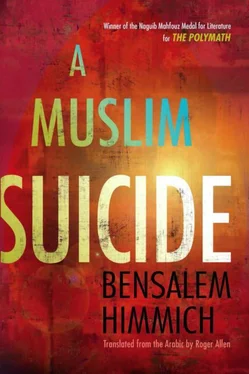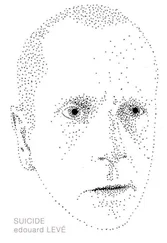The kinds of sickness that used to affect residents and others passing through included colds, fever, measles, diarrhea, constipation, and the like. With God's help and the vegetal concoctions and drug compounds I put together, I managed to treat everyone. But, among all those residents, how can I possibly forget the person who preferred to suffer pain till death rather than allowing me to examine his hemorrhoid-infected anus? All of which calls to mind another story that concerns Imam Idris al-Shafi`i*-may God give us the benefit of his memoryand yet another situation of a different and particular kind. It involved a highly disturbed mental patient-how can I possibly forget it?
That morning Abd al-Barr came to see me. As he told me about the patient, he was clearly distressed.
"My dear Ibn Sab'in," he said as we shared breakfast, "this particular patient is really strange. He professes no religious faith and believes that his own creation is badly awry; he's convinced that he looks exactly like a monkey. His delusions are now so bad that he runs away from any park or forest where there are monkeys; in fact, it's the same even with pictures of those particular animals, which he describes as debauched and uninhibited. Oh dear, what can be done when these symptoms make themselves evident, intermittently at first but then with great insistence? The same thing is triggered by his dreams as well and by the way other people treat him, all of which makes it impossible for him to ignore what's happening to him. What aggravates the entire situation is that we have no idea what to do about the mirrors he insists on putting up so he can regularly check on his dreadful resemblance to monkeys. As time has gone by, his condition has become so chronic that I've been forced to call in fortune-tellers and mystics of various kinds. Their counsel to him has been to pray and seek the sweet scent of the divine. Thus far, they've decided to keep him away from people and mirrors so that his animal instincts can be obliterated through a concentrated focus on contacts with the spiritual realms. At this point he's been here at the zawiya for a year, following these regimes, but there has been no palpable improvement in his condition. It fluctuates between periods of relief and others of chronic intensity. I've even offered to teach him how to read so that he can use the enlightened learning of the major source-texts on matters heavenly and earthly as a means of protection, but all to no avail."
As the warden finished his account, he gave me a look of one seeking a solution or at least some help.
"A really peculiar situation!" I replied. "If the measures you've described have not worked, then God alone can provide a cure."
"God alone," he said, "and you as well."
I shuddered to hear him say such a thing.
"The patient tells me," the warden went on by way of explanation, "that the only time he feels any relief is when he is looking at your face. He wants to join your coterie of visitors and companions and promises that he won't be a bother or burden to you."
I welcomed the idea, although I was still not a little surprised. The warden looked relieved and clapped his hands twice. A middle-aged man now appeared and stood in front of us, eyes lowered in embarrassment. He looked like a human being, not a monkey, with a circular-shaped head and snub nose. He was short and narrow-shouldered, and his lips were chapped. I stood up to greet him and help him relax. I asked him his name and profession. With a sideways glance he told me his name was `Isa al-Aftasi, and he had had a number of minor jobs.
"Do monkeys realize they look like you?" I asked. "Do they have any way of knowing?"
He shook his head.
"Even if we supposed that monkeys could know such a thing," I went on, "do you think they would be going through the kind of grief and trouble that you are? Do you think they would be trying to outdo each other, the way we are now?"
Again he shook his head.
"So, you're you," I went on, "and they're they. The only thing in common is an animal nature, and that can't possibly have any connection with the traits that God has given you: an expressive soul, a mind, and thought, just like every other human being He has created and endowed."
The man's expressions changed, and he burst into a smile. He asked my permission to leave, followed by the warden, who was rubbing his hands together. "Good heavens!" he kept repeating.
IN MY CURRENT QUARTERS time passed pleasantly; the days were full of positives rather than negatives, of ups rather than downs. Even the birds, it seemed, headed our way in quest of their own share of their particular qualities and features. I used to go into Sabta once or twice a month to stroll around and get whatever I needed; I would frequent its Kasbah and mosque and make some purchases at the port: ointments, perfumes, fish, and bread.
The city itself had expanded outward because floods of people kept arriving from Spain, Muslims and some Jews as well, the elite and common people alike. Some were wealthy, others indigent, but they were all united in their sadness and grief. Fortunately they had no difficulty integrating themselves into the daily lives of the people of Sabta, where they could feel safe and respected.
One day I was meandering my way through the fishmongers' stalls at the port, looking for some shark, mullet, and carp, when I spotted a woman staring at me, her eyes gleaming behind a thin black veil. Completely oblivious to my surroundings, I began to take in her perfect beauty and to exchange deeply meaningful glances with her. I only came back to my senses when the fishmonger whose catch I was still holding addressed me: "God be praised! Do you like what you see?"
"Who?" I asked.
"Excellent choice! Good and succulent…"
"Who?" I said again.
"The fish you're holding!"
I paid the man for the fish and some others that were smaller, but declined the other fish he offered me. Once I left his stall, I noticed that the woman was still in sight, so I quickened my pace. But just then an annoying dervish stopped me and refused to get out of my way until I had explained to him how it was that beans and humus were called poor man's meat; and what wisdom was there in choosing fish over meat? While I was concocting a response that this idiot could understand, I realized that the object of my quest had by now disappeared without a trace. Rather than go on looking for her, I decided to trust in God and return to my residence.
It was almost evening by the time I got back to my room. I sat there, looking at the carp, with its eyes open, its thin nose and lips, its delicate features, and its wonderful shape and smell. So tempting and luscious was its body that it seemed to be enveloped in a gleaming white halo. I was so thrilled by its appearance and eager to consume it that I rushed to prepare it for grilling so that I would gain the greatest possible benefit from eating it. And so it was. Once I had finished, I gave thanks to God Almighty and lay down to concentrate on the concept of those gorgeous, bright, mascara-lined eyes I had seen. When I had first spotted her, she had lowered her gaze, and I got the impression that I was looking at a devout recluse. But then I had taken a longer look, and the sense of pleasure I felt was even stronger and more penetrating, the kind that, within the context of women and pleasure, will regularly strike the lover-all in accordance with the practice of the Prophet of Islam, who declared, "There is no monasticism in Islam." It was that stronger and more penetrating sense of delight that was affecting me now, as I lay there on my own recalling the face of that lovely, radiant woman.
How amazing that I should feel so passionate toward those who make up half of humanity!
Читать дальше












